The city of Oxford is another year older — and it’s people, another year wiser.
As the year-long celebration of Oxford’s 175th birthday came to a close Saturday at the Old Church, its chapel resonated with the voices of Oxford’s political and social elite and the echoed harmony of the Oxford College Gospel Choir.
“Usually, when one is invited to a birthday party or anniversary party, the guest is usually expected to bring a gift,” said John P. Godfrey, a member of the steering committee, standing at the podium with a smile. “So this time, we’re not asking for gifts from you; we have prepared the gifts for you. At the end, the ushers will pass out a book that we have begun ... with much anxiety, we weren’t sure if it would get done.”
The book, “Deep Running Roots, Far-Reaching Branches: The Story of The City of Oxford, Georgia,” is a tribute to the town’s 175 years, a testament to the city and its people.
Drafted by the Biography, Storybook and Historical Site committees, members were tasked with collecting the stories of Oxford’s past: the citizens who’ve made a difference beyond the confines of the Oxford city-limits; the African American citizens whose heritage and identity have been shaped by slavery and segregation; the community members who’ve contributed to the city; the local legends and oral histories of the past; and a tour of Oxford’s historical sites.
“We were shaky on wether they’d get it done in time,” Godfrey said, “But they did it. They did it.”
The editor of the book, Lisa Dorward, received praise from Godfrey for her work, as did the committees responsible for collecting and polishing the stories.
“And I might add ... there are three errors in there that they know,” he said, provoking laughter from the audience. “And they didn’t want to give it to you ... but most of the people looking through it won’t recognize it anyways. So we want you to accept our gift, with the three errors ... and we’d like to thank you for being here with us this morning.”
Despite the few errors, Dorward believes Oxford residents — new or old to the city — will enjoy learning about the city’s past.
“I think the way we designed the book, you don’t need to read it cover to cover,” said Dorward after the convocation. “The first and second sections are biographies ... and the third section is the oral histories. When you’re reading the oral histories, you can go back to the biographies and read about their lives, and what life really was like in Oxford since its inception.”
Having transferred to Oxford just four years ago, Dorward’s perspective differs from residents who have grown up in the city their whole life.
“And that to me, is one of the most enlightening things about the project, hearing from people who grew up in Oxford,” Dorward said. “I wrote a story about coming to Oxford ... and some of the people wrote about growing up in a certain house, and we have the historical sites section for people to make a connection there as well.”
Later, Godfrey spoke about the complicated past of the city, it’s early accomplishments and initiatives , with the Oxford College of Emory University, and the darker aspects of its story, such as the dozens of individuals kept as slaves in the town until the end of the Civil War.
“The town’s founders were Methodist men who had an idea of how the city should be built,” he said. “Alcohol and gambling were not permitted for quite a while in this town ... they thought it should be peaceful and beautiful. And the pursuit of knowledge was one of the biggest goals.”
And Godfrey noted that Oxford College encouraged the education of women early on. “Which was not the norm in the 19th century.”
Dr. Hoyt Oliver spoke in place of Reverend Dr. Herchel Sheets, who could not attend due to medical complications. Oliver spoke of hope and change with Atticus Haygood’s Thanksgiving sermon, “The New South,” which called for sweeping change throughout the region.
And on the notion of Oxford becoming a beacon of hope and change, Dorward believes Oxford is her “happily-ever-after-town,” which she never wants to leave.
“I call my house my happily-ever-after-house,” Dorward said. “I’m never leaving. It’s a lifetime project, and when you take on an historical house, it’s lifetime maintenance.”
After the ceremony ended, residents were given the complimentary books and calendars created by the committees.
And as some people left the church, others congregated around the pews, enjoying conversation and making connections.
“I think it was a beautiful ceremony,” said Senator Ronald Ramsey. “It chronicles the rich and diverse history of Emory college and the city of Oxford, and the diversity of it’s people.”
Aside from the convocation being a ceremony of entertainment and celebration, it was also an opportunity to learn. Including the fact that the city’s former “Tree that owns itself,” which was cut down in 2006, has been recycled through it’s seeds and spawned a whole new generation of trees planted in Oxford and abroad.
“I had attended a couple of city council meetings and knew that the city was very proud and protective of its trees,” he said. “But I have a new appreciation for the dedication of their trees, and regenerating the history of these trees in the city.”
And after celebrating the city’s anniversary, Oxford Police Chief Dave Harvey, who has served for six years, reflected on what he’s learned and what the town means to him.
“It makes me feel really honored to work here,” Harvey said. “And I’ll stay here as long as they keep me.”
And it would appear Chief Harvey’s sentiment is felt among many Oxford residents.
“I really feel like it’s my hometown now,” Dorward said. “I love this city.”





